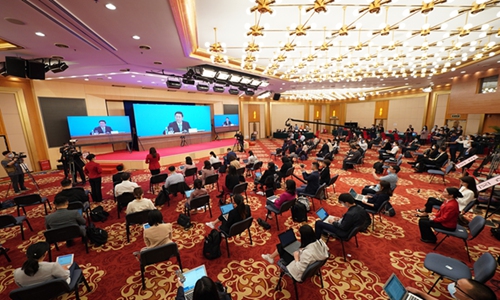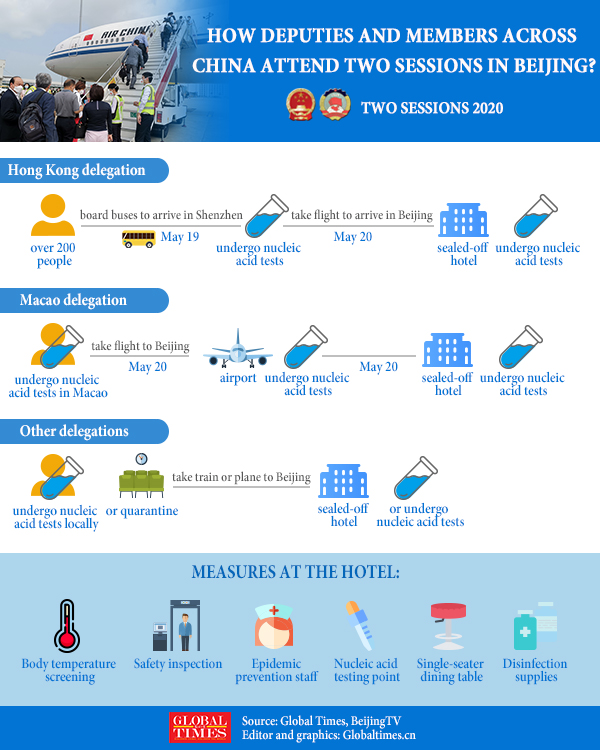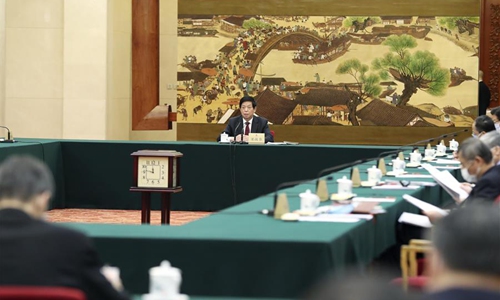Two sessions ‘in cloud’: expected to inject confidence, unite people in wake of COVID-19
By GT staff reporters Source:Global Times Published: 2020/5/20 23:23:40
Public health mechanism to get special attention

The third session of the 13th National Committee of the Chinese People's Political Consultative Conference (CPPCC) holds a press conference in Beijing on Wednesday. Guo Weimin, spokesperson of the conference, introduced the conference schedule and answered questions from Chinese and foreign journalists. In accordance with the requirements of epidemic prevention and control, the press conference was held via videoconference. Photo: VCG
After a 78-day delay, China entered a "two sessions" mode on Wednesday as the country's top advisory body held the first online press conference of this year's two sessions - a special arrangement in line with epidemic prevention and control work - while thousands of deputies and members from China's provinces, autonomous regions and municipalities as well as two special administration regions (SARs) arrived in Beijing.
Holding China's most important annual political meetings as the world is still battling a coronavirus pandemic sent out a clear and strong signal to the world that the country has made significant progress in its anti-epidemic battle, some deputies said. Some participants of the two sessions noted that they would witness the strictest epidemic prevention and control work during the meetings, as the work would become routine to accelerate social development.
Deputies to the National People's Congress (NPC) and members of the National Committee of the Chinese People's Political Consultative Conference (CPPCC) from East China's Jiangsu Province, Southwest China's Tibet Autonomous Region, Central China's Hubei Province, Northwest China's Xinjiang Uygur Autonomous Region, as well as Hong Kong and Macao SARs arrived in Beijing on Wednesday. According to some who spoke to the Global Times, all of them received nucleic acid tests twice - one at the place of their departure and another in Beijing.
This year's annual meetings of China's top legislative body and its top consultative body, delayed for the first time since the country adopted the early March schedule in 1995 due to the epidemic, will kick off on Thursday and Friday with special arrangements in line with epidemic prevention and control work.
Deputies and members to the two sessions from different places across the country have mixed feelings about this year's two sessions.
Despite the delay, opening the meetings would show that the Chinese people, after fighting the anti-COVID19 battle, have seen hard-won results, some lawmakers and political advisers said. While expecting the return to normalcy, Chinese policymakers are still facing a tough road ahead in drawing lessons from the unprecedented public health crisis, and pushing forward the resumption of production and businesses to achieve economic and social development targets.

Infographic: GT
Special 'two sessions'
After Huang Xihua, an NPC deputy from South China's Guangdong Province, arrived at a hotel in Beijing on Wednesday afternoon, she took several pictures of the capital's blue sky and posted on her WeChat Moment.
"As I arrived in Beijing, embracing the green trees, blue sky and white clouds, I felt how special this year's national two sessions are. They were postponed for more than two months. I believe many people have special expectations for this special event, hoping that the two sessions could give people new confidence and introduce more policies to benefit the people," Huang said.
More than 200 Hong Kong delegates went to Shenzhen through the Shenzhen Bay Port on Tuesday, where they underwent nucleic acid tests and furnished health records for the past 14 days. All passed the tests and took a chartered Air China flight to Beijing Wednesday.
After they arrived at the Beijing Capital International Airport, no tests were carried out and shuttle buses took them directly to their designated hotel, where they underwent another nucleic acid tests. Each person eats at one table with a certain distance between each another.
Witman Hung Wai-man, a Hong Kong deputy to the 13th NPC, told the Global Times Wednesday that the Hong Kong delegation has a WeChat group to disseminate news and exchange ideas.
Wu Zhiliang, a Macao member of the CPPCC National Committee, told the Global Times Wednesday that the Macao delegation flew to Beijing directly and underwent nucleic acid tests at a Beijing airport and the hotel twice.
The flight which took participants of Southwest China's Tibet Autonomous Region for the two sessions arrived in Beijing on Wednesday afternoon. The deputies and delegates say this year's two sessions after the COVID-19 epidemic would further unite people of different ethnic groups in the country, according to a statement Tibet's publicity department sent to the Global Times on Wednesday.
Doctor Penpa, a member of the CPPCC National Committee, could not hide her excitement after arriving in Beijing. It is her third year to take part in the two sessions. A doctor from Tibet's disabled rehabilitation center, Penpa vowed to make more valuable suggestions to fulfill her duty.
Lawmakers and political advisors from Central China's Hubei Province - the region hit the hardest by the outbreak - have arrived in Beijing. The province will be represented by 111 deputies to the NPC and 41 members to the CPPCC, according to chinanews.com. Some deputies told the Global Times in an earlier interview that they had to undergo a week of quarantine in Wuhan, the provincial capital, before flying to Beijing.
"2020 is a significance year. It is necessary to do a good job in the prevention and control of the epidemic situation while ensuring the completion of the decisive battle and the task of overcoming poverty and attacking key points, and to build a well-off society in an all-round way," Guo Weimin, spokesperson of the third session of the 13th CPPCC National Committee, told a press conference on Wednesday afternoon conducted via video link.
Considering the requirements of epidemic prevention work, the third annual session of the 13th CPPCC National Committee will last seven days, four and a half days shorter than previous sessions, Guo said, noting that an opening meeting, a closing meeting and two general assembly speeches will be convened, one of which will be held via video link.
Foreign envoys in China will be invited to attend the opening and closing meetings, Guo noted.
Nigeria's Ambassador to China Baba Ahmad Jidda told the Global Times on Tuesday that a diplomat from the Nigerian Embassy who was invited to attend the two sessions checked in early at Beijing's Diaoyutai State Guesthouse, where important guests such as heads of foreign states and governments are usually accommodated. The process lasts two nights and requires a nucleic acid test before entering the conference, Jidda said.
All attendees including all envoys and invited guests will be required to undergo nucleic acid testing for COVID-19.
At 5 pm on Wednesday, Minister Counselor from the Serbian Embassy in China Ivan Kandijas was prepared to head to the Diaoyutai State Guesthouse, where he will stay for two nights to participate in the opening ceremonies of the two sessions. This is the second time Kandijas will participate in the two sessions.
He told the Global Times he felt excited as the two sessions are the most important events in China. He took one nucleic acid test Wednesday night. If it turns out negative, he will be transported to the Great Hall of the People to participate in the two sessions by an arranged shuttle bus.

Li Zhanshu, chairman of the National People's Congress (NPC) Standing Committee, presides over a chairpersons' meeting of the 13th NPC Standing Committee in Beijing, capital of China, May 18, 2020. (Xinhua/Liu Weibing)
Reform and targets
The number of reporters covering this year's two sessions has been greatly reduced in line with the COVID-19 epidemic control work. Delegations also canceled their "open day" and group interviews, and a majority of interviews would be carried out through videoconference and email, which some called "the two sessions in cloud."
Barred from face-to-face interviews, Chinese reporters decided to conduct "cloud interviews" together with some high-profile lawmakers and political advisers. In a WeChat group where hundreds of reporters gathered to help each other cover the two sessions, some listed their names, agencies and topics and set up an online conference room, in which they realized the real "group interview" similar to a face-to-face one.
Some of the key issues the general public will focus on during the meetings are a review of the country's COVID-19 response, economic and social development targets, poverty alleviation and the establishment of a moderately prosperous society in an all-around way, moving closer to a civil code, ensuring people's livelihood and countering uncertainties of the external environment, media reported.
"Holding this year's meetings also indicates the significant progress in fighting the COVID-19 outbreak. However, when the situation improves, we need to discuss how to prevent a resurgence while improving our public health crisis response," Tam Yiu-chung, Hong Kong's deputy to the NPC, told the Global Times in an earlier interview.
Political advisers have also made many suggestions on how to improve the country's public health emergency management system, Guo said at the press conference on Wednesday.
Many NPC deputies and CPPCC National Committee members have also proposed the establishment of a mechanism for direct communication between the central and local governments in major public health emergencies, and to improve the current infectious disease reporting system. They said the heavily invested system, set up after the SARS outbreak in 2003, was believed to have failed to properly function during the earlier stage of the COVID-19 outbreak in China.
Newspaper headline: China in ‘two sessions’ time
Posted in: POLITICS,FOCUS